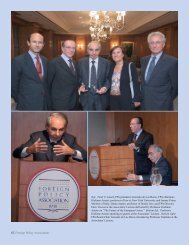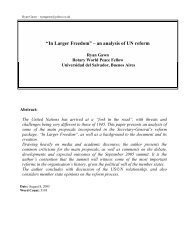Celebrating 90 Years - Foreign Policy Association
Celebrating 90 Years - Foreign Policy Association
Celebrating 90 Years - Foreign Policy Association
You also want an ePaper? Increase the reach of your titles
YUMPU automatically turns print PDFs into web optimized ePapers that Google loves.
Board of Directors<br />
Delegation to Greece<br />
At the invitation of Greek <strong>Foreign</strong> Minister<br />
Dora Bakoyannis, a delegation of the<br />
<strong>Foreign</strong> <strong>Policy</strong> <strong>Association</strong> Board of<br />
Directors spent a highly informative week in<br />
Greece during July 2007. Our extraordinary<br />
hosts were Alexander Philon, formerly the<br />
ambasador of Greece to the United States,<br />
and Adamantios Vassilakis, who served as<br />
permanent representative of Greece to the<br />
United Nations from 2002 to 2007. They<br />
arranged a stimulating itinerary.<br />
The FPA delegation converged on the<br />
sybaritic island of Santorini for a valuable<br />
briefing and exchange of views with key<br />
members of the Greek <strong>Foreign</strong> Ministry and<br />
with the U.S. chargé d’affaires to Greece,<br />
Tom Countryman. Carol Baumann, an FPA<br />
director and former assistant secretary of<br />
state for intelligence and research, summarized<br />
key points raised at these meetings.<br />
1. GREEK-TURKISH RELATIONS<br />
Greece favors the entry of Turkey into the<br />
European Union. This position is contrary to<br />
the U.S. general public’s perception. Journalists<br />
made the point that Turkey’s membership<br />
will allow better solutions to bilateral<br />
Greek-Turkish relations. Greece’s Socialist Party has<br />
switched its position and now supports Turkey’s entry<br />
into the EU, and public opinion in Greece also has<br />
changed to favor entry. George Papandreou, who<br />
was the Greek minister of foreign afairs from 1999 to<br />
2004, stated that Turkish EU membership could put<br />
the Greek-Turkish relationship in a different perspective<br />
and that the EU could be a “major lever” to change<br />
the internal situation in Turkey. All Greek political parties<br />
now favor Turkish admission, although the Turkish<br />
government is somewhat less interested in joining the<br />
EU. Theodore Couloumbis argued that Greek-Turkish<br />
relations have improved since 19<strong>90</strong>. Both Greek parties<br />
favor cooperation with Turkey, and trade between<br />
the two countries has increased tremendously.<br />
120 | FOREIGN POLICY ASSOCIATION<br />
Evangelos Meimarakis, the Greek minister of defense (left), greets FPA<br />
Director Richard Lannamann. In the background is Adamantios Vassilakis,<br />
who served as Greece’s ambassador to the United Nations.<br />
2. POLITICAL PARTIES AND POLITICS IN GREECE<br />
Journalists suggested that Greek political parties are<br />
now “converging” on several issues, including relations<br />
with Turkey, the economy, and the question of<br />
Macedonia. While the parties may agree on strategy,<br />
they differ on tactics. George Papandreou said that the<br />
Greek government is not active enough on Turkey’s<br />
entry into the European Union and on the Macedonian<br />
issue. No progress has been made on continental shelf<br />
controversies, he said, and the issue has not been well<br />
managed. In his view, priority economic goals include<br />
investment in education, reform of the bureaucracy,<br />
stronger orientation toward markets, and reform of<br />
agricultural and production systems. He also said that<br />
Greece should develop “high quality” tourism.













